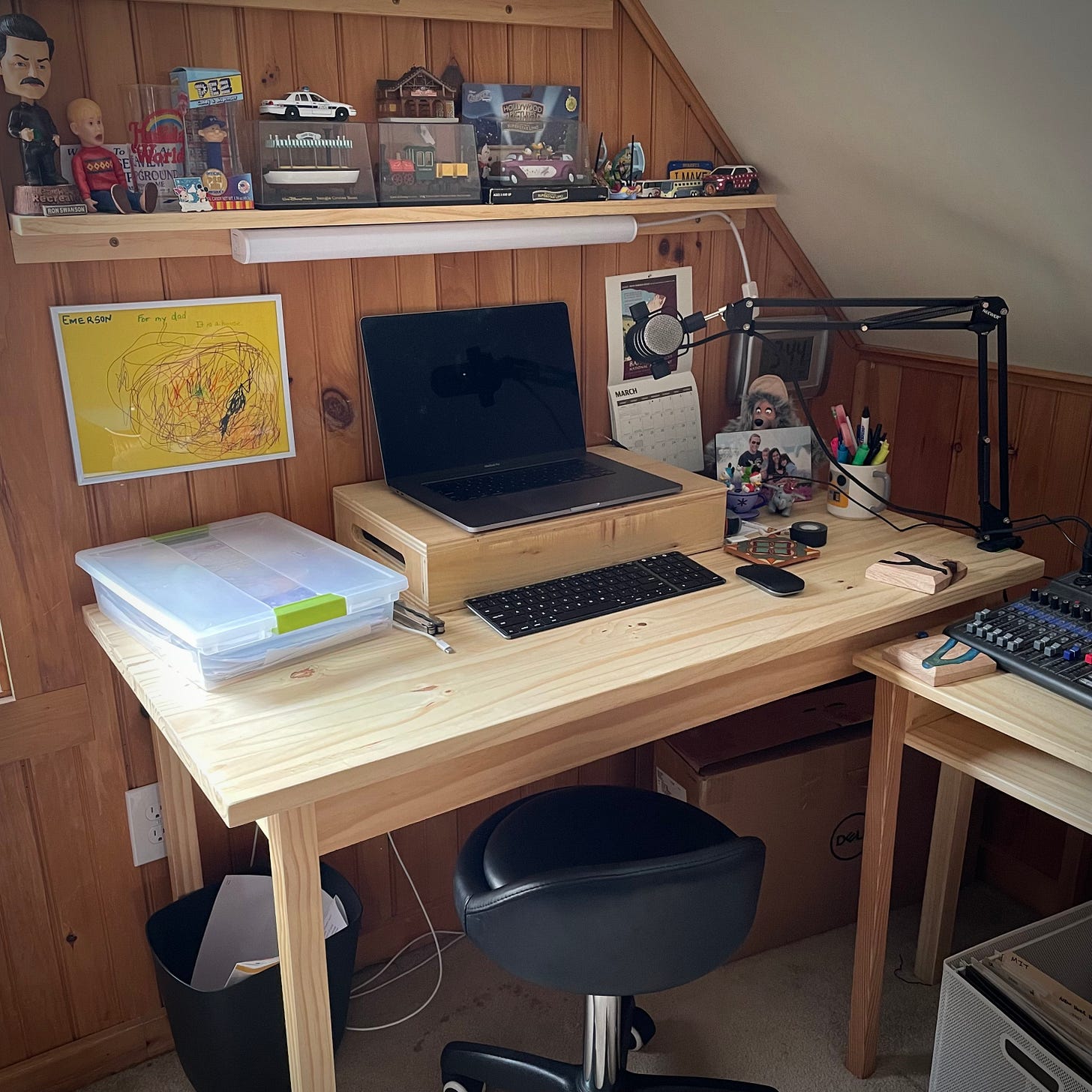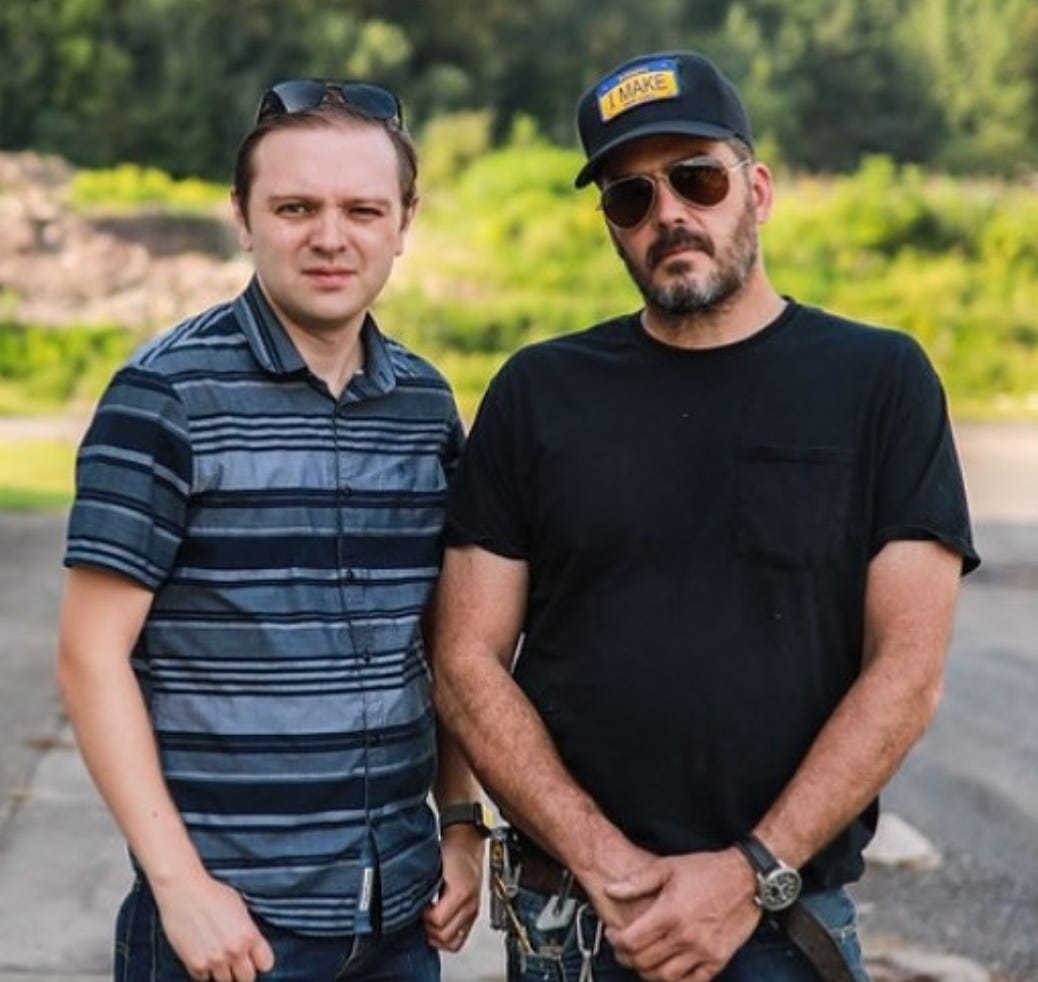The Old Bosses Are Losing
Whether Vladimir Putin or a CEO, the power is clearly in the hands of the people now.
The Roller Coaster Continues
Good morning everyone and welcome back to the Quarantine Creatives newsletter, a weekly companion to my podcast of the same name. It’s been a cold week here in Massachusetts- so cold that when I went to check my maple taps, I found icicles a few times. Yet today’s high is in the 60s!
This week, I have an essay looking at how the pandemic and the politics of this moment may finally be shifting the power back to the average person.
Please stay tuned until the end for a special announcement too!
Bosses on the World Stage
For a long time, I have felt helpless in this strange era. It has been a bit like one of the old Super Mario Brothers video games. At every turn, there has been a series of fireballs, a line of toxic walking mushrooms, or a pool of lava waiting for us all.
These obstacles take different forms. It might be the devastation of a natural disaster, made worse by climate change. It could be unjust laws, seemingly designed to punish the most vulnerable. It may be a mountain of debt, taken on with the belief that a lucrative career would pay down those loans in no time. Whether financial, familial, professional, or something else, it feels like just maintaining our current position is a struggle.
Even if you’ve been able to navigate all of our modern minefields, there's always a spiky boss that shoots fire, waiting to unleash wrath at the end of each level. That boss may be a literal toxic boss in a workplace, it may be an oppressive system, or it may be a political leader.
If you’ve been reading this newsletter (or listening to my podcast) for a while, you know that I was not a fan of the prior American President. I was surprised and discouraged that so many people liked his tough guy posturing and insecure policy positions that targeted immigrants, women, the LGBT+ community, and so many more. I saw him as a cartoonish bully, not too different from an enemy in a Mario game.
Emboldened by the top of the ticket, we continue to see state legislatures and governors across the country signing regressive, discriminatory laws that seek to limit abortions; restrict discussing issues of race, sexual orientation, or gender identity in schools; and make voting significantly more difficult for minorities.
Unfortunately, this trend does not stop at our borders. Far right, anti-democratic regimes have been coming into power all across the world in the last decade or so, from Jair Bolsonaro in Brazil to Narendra Modi in India.
I had high hopes that Joe Biden would be able to set a more progressive agenda, but the slow movement on important issues like climate change, infrastructure, and student loan debt is disappointing and could prove devastating this November.
My feeling of helplessness comes in part from not knowing how to take action that would be meaningful. I could call my senators, but I am represented by Elizabeth Warren and Ed Markey, so I would only be preaching to the choir. My governor (Charlie Baker) happens to be a Republican, although he is a centrist and pragmatist, more Mitt Romney than Marjorie Taylor Greene, so my daily reality at home is relatively progressive.
Even as it seems like things are getting worse by the day, it also feels like the power balance in the world is starting to shift and that the autocratic bullies’ days are numbered. This feels like the moment when a humble plumber has stepped on the magic switch that retracts the bridge under the horrible boss, plummeting him into a pit of flaming lava (figuratively, of course).
Nowhere is this more clear than with the situation in Ukraine. I am no geopolitical expert, but it appears from what I have seen that Putin, the ultimate video game villain, has greatly underestimated the Ukrainian people. This fight is far from over, and it will likely get much worse, but the way that average Ukrainians have rallied behind their flag and defended their homes shows conviction and resolve.
President Volodymyr Zelensky in particular has inspired people around the world by standing up to the invading Russian forces. His adept usage of social media helps his message of resilience reach well beyond his country’s borders.
Sarah Kendzior (who I interviewed back in 2020) summarized Zelensky’s appeal in her podcast Gaslit Nation, which she quotes below on Twitter:

To take Kendzior one step further, Zelensky is not the type of boss that would sit in his office suite while there’s a crisis on the factory floor. He seems, instead, to be the type of boss that is willing to roll up his sleeves and work alongside his team to get the job done.
But this shift away from a powerful boss is not just in the world of global affairs. I see a strong connection between the politics of the moment, the pandemic, and what workers are now expecting (and sometimes demanding) in their professional lives.
Executive Upheaval
Starbucks workforce is unionizing. Pay is up 5.1% on average since last year. Jobs are plentiful, but applicants are scarce. Workers have more leverage than they have had in a long, long time, and they are using it.
Derek Thompson wrote a piece for The Atlantic last month that looks at why the return to the office has been so slow for white collar workers, and it’s at least in part related to this power shift.


Thompson makes the case that life has returned to normal in many places- restaurants, airports, stadiums. Yet offices lag behind that. We are clearly ready to return back to some version of our old lives, just not the office portion.
It has been two years (almost to the day) since I was last in an office and I am in no rush to return. I am grateful that I have a really amazing boss who has embraced a flexible team. I am also fortunate that I have a dedicated space for my home office, which is much easier than working from my dining room table or my bedroom.
My office is in our attic, which at various points over the last decade has served as our bedroom, a guest bedroom, storage space, a homeschool classroom, and now an office and playroom.
As a video producer, the only work that I have not been able to do from home has been working on a handful of shoots that required me to be in-person. But a lot of production has been done remotely. New tools like OpenReel and Riverside have allowed talent on certain projects to self-tape with supervision, usually at a higher quality than using Zoom.
In The Atlantic article, Thompson argues that we are in the midst of a major upheaval to the 40-hour, 5-day work week model that will change our relationship to everything. It will reshape public transit, how we use commercial space, the businesses that support office work (dry cleaners, coffee shops, bars), and many other areas we haven’t considered yet.
I read a Washington Post article that reached similar conclusions when studying a video game company that successfully moved to a four day week after a period of testing the idea last year:
In the end, 100 percent of 51 developers surveyed after the test said they wanted to permanently switch to the four-day workweek, compared to 82 percent who believed a four-day workweek was better than a five-day workweek before the test. Additionally, 91 percent said it improved their work-life balance, 89 percent said the same of wellness, 90 percent believed it will improve retention and 79 percent said it bolstered their ability to complete work.
I know that TV, video, film, and VFX production are often done at breakneck speeds with an attitude of “this is the work, either rise to it or get out.” I lived by this mantra personally for many years, but now I see the err of that logic. I hope this attitude is starting to die out in others post-pandemic.
Of course, the options for remote and/or flexible work at the moment are only available to white collar workers. As the pandemic has shown us, it is very difficult to be a virtual nurse, firefighter, grocery store clerk, farmer, or bus driver. But the mentality of less focus on work will likely trickle down in ways yet unknown to other sectors of the economy.
Who Are We When We Work Less?
I also read this editorial in the Washington Post by Christine Emba this week that was related to this topic:
Emba argues that the case employees have been making to employers for a shorter work week often look at benefits to the company, mainly increased productivity and greater focus on the work.
But she contends that the more important reason for shifting how we approach work is for more personal balance. Having a three-day weekend every week, according to Emba, allows people to explore hobbies or learn new skills that are not strictly job related:
When we focus on how a shorter workweek will make us better employees, we’re making the wrong argument to our bosses and ourselves. The four-day workweek shouldn’t just be about becoming more productive — the real benefit is that it would allow us to be fuller people.
I spent much of my professional life concealing the “hobbies and interests” side of my personality, perhaps because that part of me was so underdeveloped as my job took most of my time, energy, and creativity.
Having spent the last two years recognizing the value in my creative pursuits and passions (and having the time to pursue them), I have come to see that the most important asset I bring to any company is not bullet points on my resume, it’s the whole me. Many managers don’t understand this, as we still don’t quite know how to quantify it, value it, or hire for it.
Is there a direct connection between video production work and cooking dinner, canning tomato sauce, or boiling maple syrup? Probably not. There is, however, a transferring of skills between those worlds; patience, improvisation, adaptability, being organized, etc. The list goes on.
And it works both ways. I make better maple syrup because of my producing skills.
Whether less time at work means more time for writing a novel, spending time with family, cooking a nice meal, mastering a dovetail joint, or simply visiting a museum, Emba contends that they all have a value that the capitalist system cannot easily quantify:
These sorts of activities are unlikely to be recognized as creating economic value. But they’re obviously rich in human value: the mastery of a craft, a connection created with others, an embeddedness in a particular community or place. These are the things that make us whole.
Whether or not we end up with a true four day work week remains to be seen, but what is clear is that Americans are finally reckoning with our relationship to work and realizing that who we are can be much fuller and richer than what our email signature or Linked In profiles can showcase.
The smart bosses understand this, or are starting to understand this, and are reshaping workplaces to fit our 21st century needs.
Others refuse to adapt, forcing employees into the office for 40 hours a week regardless of productivity, including New York Mayor Eric Adams, a city heavily reliant on office culture:

We don’t know how the Russia-Ukraine situation will resolve, but I have a feeling that both Putin and many modern CEOs are overplaying their hand in ways they will come to regret.
What’s Next
I have talked for a while about the podcast returning, but the moment has finally arrived! It’s taken me a few weeks to get pitches sent, interviews scheduled, and episodes edited, but the first of a new batch will be starting next week.
Maker, YouTuber, TV star, and friend Jimmy DiResta will be joining me for Episode 89 of Quarantine Creatives on Thursday. Jimmy and some of his friends from the maker community have a new show on Netflix called Making Fun.
It’s an innovative building show where these five expert makers take pitch ideas for imaginative inventions from kids. The show is streaming now and is a lot of fun! Here’s the trailer:
Look out for that episode this Thursday on your favorite podcast platform. And if you haven’t heard it yet, you can take a listen to my first conversation with Jimmy from June, 2020.
If you have questions, comments, thoughts, ideas, or anything else that you’d like to share, please feel free to email me anytime.
If you’d like to catch up on past episodes of the Quarantine Creatives podcast, they can be found on Apple Podcasts, Spotify, or wherever you listen.
Please consider sharing this with a friend that you think might enjoy reading this, or better yet, share it on social media so you can tell hundreds of friends!
If you’ve missed past issues of this newsletter, they are available to read here.
Stay Safe!
Heath














